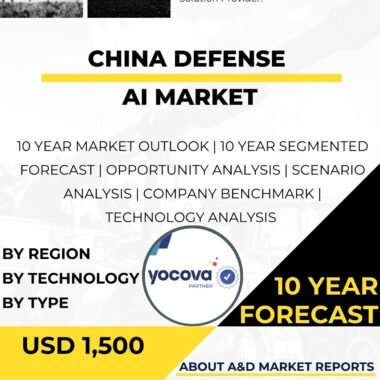Description
Japan Defense AI Market has seen significant growth in recent years. This growth reflects the nation’s focus on enhancing defense capabilities and addressing security challenges in the Indo-Pacific region. Artificial intelligence (AI) has emerged as a transformative technology, offering advanced capabilities in autonomous systems, data analysis, and decision-making support. Japan faces evolving global security threats, regional tensions, and the need to maintain a technologically advanced defense force. To address these challenges, the country has invested heavily in defense AI while fostering domestic innovation and technological expertise.
Applications in Autonomous Systems
One major application of defense AI in Japan is in autonomous systems and robotics. The Japan Ground Self-Defense Force (JGSDF) and other branches have deployed AI-powered autonomous ground vehicles and unmanned aerial vehicles (UAVs). These systems perform tasks such as reconnaissance, surveillance, and logistics support with greater precision and efficiency than traditional manned systems.
AI-powered autonomous systems increase operational flexibility, reduce risk to human personnel, and optimize resource use. AI algorithms allow vehicles to adapt to dynamic environments, making them valuable for surveillance missions, reconnaissance, disaster relief, and humanitarian assistance.
Domestic Development
Japan emphasizes indigenous defense capabilities. Domestic companies and research institutions actively develop AI technologies tailored to national defense requirements. Collaboration between the government and the domestic defense industry fosters innovation and strengthens the domestic defense AI market.
Data Analysis and Decision Support
Beyond autonomous systems, defense AI supports data analysis and decision-making. AI algorithms can process vast amounts of data from sensors, satellites, and intelligence sources. This processing provides actionable insights and predictive analysis, enabling faster and more accurate decision-making. Defense operations benefit from improved situational awareness, mission planning, and overall effectiveness.
International Cooperation
Japan’s defense AI market benefits from multinational collaboration. The Japan Self-Defense Forces participate in joint exercises and operations, enhancing regional security and interoperability. Advanced AI systems improve the safety and effectiveness of these operations by providing real-time analysis and mission support.
Japan’s alliance with the United States further strengthens its defense AI capabilities. The U.S. supplies advanced AI technologies and expertise, enabling Japan to integrate cutting-edge systems into its defense operations. This partnership reinforces regional security and stability.
Market Challenges
The defense AI market faces several challenges. Ethical and legal considerations are critical as AI becomes more sophisticated. Japan must ensure accountability and transparency in AI-driven decision-making.
Cybersecurity is another major concern. Interconnected AI systems can be targeted by cyber-attacks and adversarial operations. Japan must develop robust cybersecurity measures to protect sensitive information and maintain operational integrity.
Cost considerations also play a role. Developing and acquiring advanced AI systems is expensive. Japan must balance investment in AI with other defense priorities.
Conclusion
The defense AI market in Japan has grown in strategic importance. AI technologies transform defense operations in autonomous systems, data analysis, and decision-making support. Collaboration between the government, domestic industry, and international partners fosters innovation and market growth.
Addressing ethical, cybersecurity, cost, and technological challenges is essential. By leveraging advanced AI, Japan can modernize its defense forces, improve operational effectiveness, and contribute to regional and global security. With its focus on modernization, Japan remains committed to integrating AI technologies to strengthen its defense capabilities.




